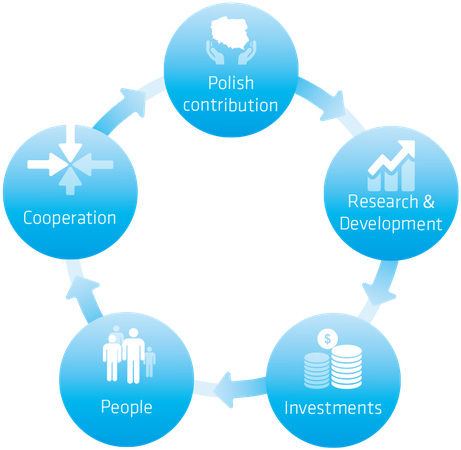





-
Application
- Industry
- Heating industry
- Individual solutions
- Law regulations
- Certification
- Research and development
- Public perception
- Investment map
-
Transport
- Hydrogen buses
- Hydrogen trains
- Special vehicles
- Law regulations
- Certification
- Research and Development
- Public perception
- Investment map
-
Production
- Technology
- Green hydrogen from Renewable Energy Sources
- Grey hydrogen
- Hydrogen production from biomass
- Law regulations
- Certification
- Research and development
- Public perception
- Investment map
-
Transmission, Storage
- Polish contribution (local content) - Poland is the third hydrogen producer in the European Union and the fifth in the world. This is a good starting position for building a complementary value chain within a low-carbon economy.
- Research and development - the chemical and refining industries are the most advanced in the implementation of hydrogen technology in Poland, but we also have a strong scientific base which can support the development of fuel cells and parts for electrolysers. The greatest challenge remains closer cooperation between the worlds of science and business and commercialisation of the effects of scientific research.
- Investments - this concerns two areas: infrastructure accompanying hydrogen technologies and subsidies for scientific centres in order to implement innovations more quickly. It will also be important to build a cooperation platform.
- People - development and implementation of hydrogen technology will create new jobs, specialisms and will open up the labour market in completely new areas. Coordination and investment in training of highly qualified specialists and personnel for the entire hydrogen economy value chain will ensure its continuous development.
- Cooperation - coordination of activities between different participants in the process of hydrogen technology development, and joint publication of the results of work carried out under the Agreement, is to enable faster development of technical thought, and help communication between research centres. It will also help to strengthen Poland's voice in the international arena and increase the activity of representatives of Polish science and business.



Cookies
Informujemy, iż w celu optymalizacji treści dostępnych w naszym serwisie, dostosowania ich do Państwa indywidualnych potrzeb korzystamy z informacji zapisanych za pomocą plików cookies na urządzeniach końcowych użytkowników. Pliki cookies użytkownik może kontrolować za pomocą ustawień swojej przeglądarki internetowej. Dalsze korzystanie z naszego serwisu internetowego, bez zmiany ustawień przeglądarki internetowej oznacza, iż użytkownik akceptuje stosowanie plików cookies. Czytaj więcej Polityka prywatności
Hydrogen valleys
138 signatories of hydrogen agreement
On 14 October 2021, representatives of the Ministry of Climate and Environment, the Ministry of Finance, representatives of state-owned companies, scientific communities and private companies signed the "Sectoral Agreement for the Development of the Hydrogen Economy in Poland".Sectoral Agreement
This document, signed by 138 signatories, sets goals and enables their implementation through mutual obligations resulting from the process of achieving a climate-neutral economy, lowering emissions and increasing the competitiveness of Polish entrepreneurs. Building a hydrogen-based value chain is to enable the implementation of zero-emission technologies in key sectors of the economy such as transport, energy, heating and industry.
The sectoral agreement is part of the Strategy for Responsible Development and the Energy Policy of Poland until 2040. It is also a key implementation instrument of the Polish Hydrogen Strategy, which defines long-term actions in the area of financing, legislation or institutional instruments.
Support for Polish enterprises operating in the hydrogen sector results from the EU climate and energy policy adopted in the European Green Deal, which aims to achieve complete climate neutrality by 2050. According to the assumptions, the share of hydrogen in the energy mix is to increase from 2% to 14%. One of the pillars of the EU strategy is the development of hydrogen technologies.
One of the ways of achieving this goal is through the creation of Hydrogen Valleys, which will be established in successive regions of Poland. Their aim is to integrate entities from different sectors, which will create a network of links serving the development of the hydrogen economy value chain.
Michał Kurtyka, Minister for Climate and EnvironmentGovernment Plenipotentiary for Renewable Energy Sources Ireneusz Zyska also informed that an ambitious "local content" indicator at the level of no less than 50% of the total value in 2030 has been written into the agreement. The added value for the Polish economy due to the achievement of this indicator is estimated at between EUR 343 and 870 million.
"The agreement includes proposals for actions focused on building the market from the demand side and creating appropriate legal regulations and institutional environment. What is particularly important is that our sectoral agreement is in line with the European Union policy in the area of hydrogen economy," he explained.
Deputy Minister Zyska also pointed out that the initiative to conclude the agreement was entirely grassroots and voluntary, and the market's interest was enormous.
The scale of interest in this initiative has exceeded our wildest expectations. I am convinced that the conclusion of the agreement and further work within the Coordinating Council for the Hydrogen Economy will allow us to take advantage of the historic opportunity to gain and maintain Poland's leading position on the emerging global hydrogen market.
Ireneusz Zyska, Secretary of State, Government Plenipotentiary for Renewable Energy Sources
The overarching goal of the agreement is to maximise the Polish contribution (local content) in hydrogen-related procurement.
The highest possible share in the supply chain of Polish entrepreneurs as well as Polish technical thought and Polish patents will be of key importance to maintaining the competitiveness of our economy, decarbonisation of the most energy-intensive sectors and effective economic competition with other countries which have also recognised the huge potential of hydrogen.
Ireneusz Zyska, Secretary of State, Government Plenipotentiary for Renewable Energy SourcesRedakcja





